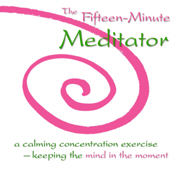The process of meditation comes to us from an ancient past, but it is valuable today for the purpose of giving ourselves a time to center ourselves, and to bring vitality and self-awareness into our lives. The Fifteen-Minute Meditator is a simple method enabling us to enjoy the many benefits meditators today are experiencing.
It is best to set aside fifteen to twenty minutes each morning and afternoon for your practice. It is wise to proceed slowly, but you may practice the mental exercise as many times a day as you wish. The stresses and anxieties of our daily lives will lessen as we practice this technique which introduces a calm approach to life's experiences.

Meditation is also complex in that many goals can be achieved by consistent daily practice. You will find that in the days that follow, you will be mentally alert and aware of the subtleties and undercurrents of the circumstances in which you find yourself. Meditation will open your mind to an intuition that until now has only been partially stimulated. It will exercise the pituitary gland of the brain and help the nervous system function smoothly. A calm awareness will be the result of dedicated practice.
Humanity has evolved over a long period of time and human instincts have taken their cue from the animal kingdom in that when we are presented with environmental stress we respond in a similar fashion as the animal that runs from danger or fights back. There is a superior way to face our daily challenges. We need to learn to stand unmoved emotionally by the tides of changing circumstances.
This meditation exercise includes a very important directive, and that is to remember to observe stress without reacting emotionally. Without the need to run away from stress or to fight back in anger, that does not solve the problem, we will no longer feel we must answer every demand made upon us. We can live out of the dictates of our hearts and at the same time present our surroundings with a new found patience and calm understanding.
Non-emotional response is an ancient principle. Many religions and philosophies suggest that by refraining to become upset or to be thrown off center we will find ourselves in better control over the circumstances in our lives. In order to do this we need to remember to remain calm when confronted by stressful situations, like unfairness, harsh judgment or violence coming from other individuals. We need to modify our emotional response to circumstances in life that are beyond our control, such as losing work or money or a loved one.
Meditation is meant to bring objectivity and an even temperament into play in daily experience. This is achieved by repeating in one's conscious thought, often during the day, the idea to remain calm in the face of stress or danger. Patience is a virtue that comes to us gradually. We begin to realize the need to acquire the ability to wait or sit with composure by first becoming aware of our impatience.
One of the first feelings we experience when embarking upon the path of meditation is the recognition of how difficult it is to sit without the urgency to do something else. We may say to ourselves that meditation is not for us because we are immediately aware of how anxious we become when we sit. It is important at this point to take another approach: It is better for us to view our inability to sit quietly as a sign that meditation will help to reveal to our conscious awareness, the content of our sub-conscious shortcomings. In time and with dedicated practice, one by one, we can tackle life's challenging moments with mature and patient understanding.
The Meaning of Meditation and Its Purpose.

Contact Us | For Wholeness Practitioners | For Resellers
Copyright © 2002 by Sarah Kalvin
All Rights Reserved